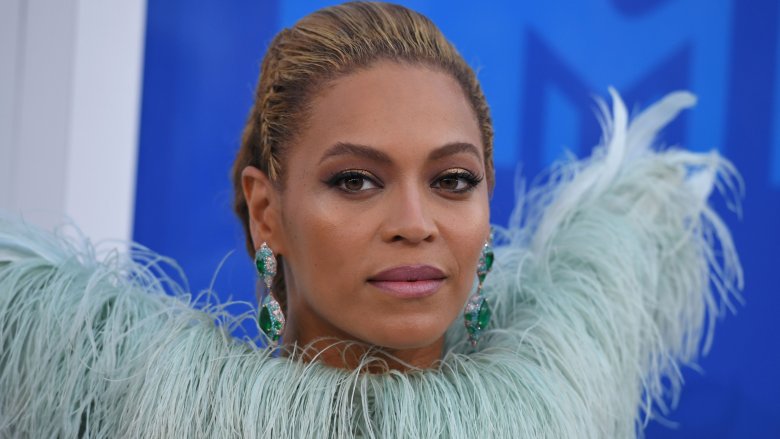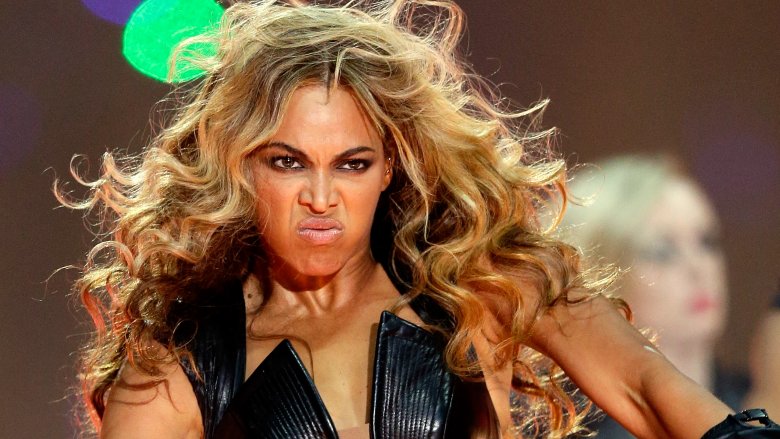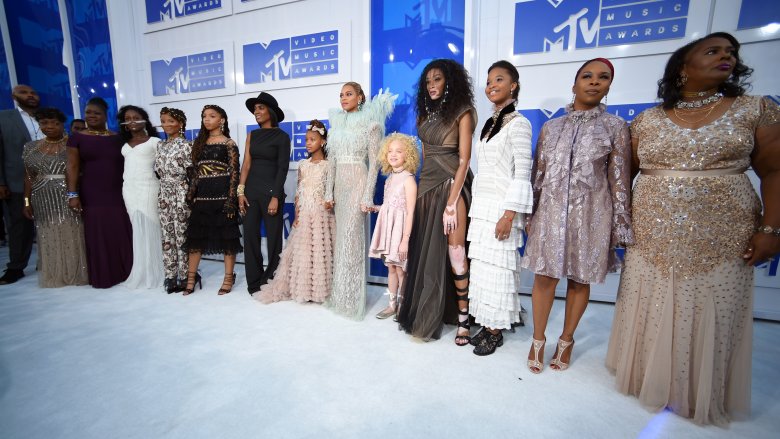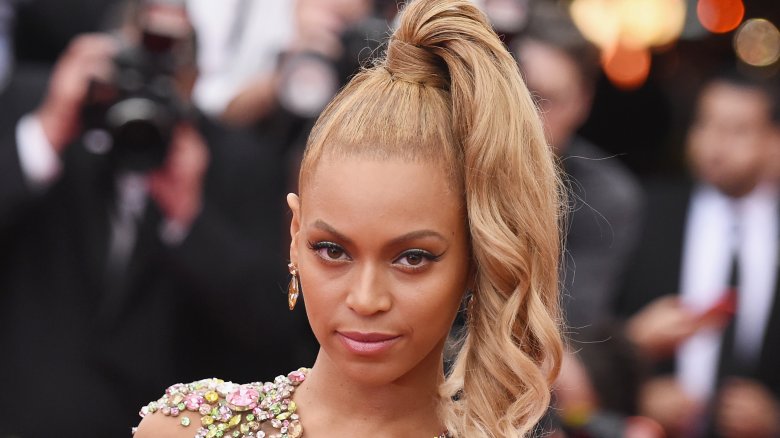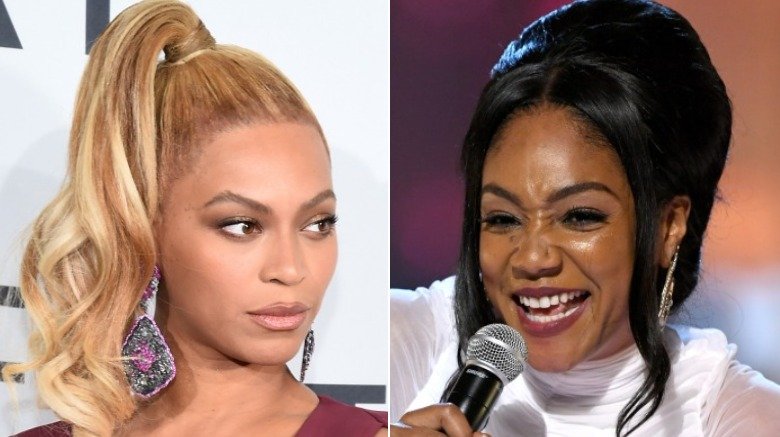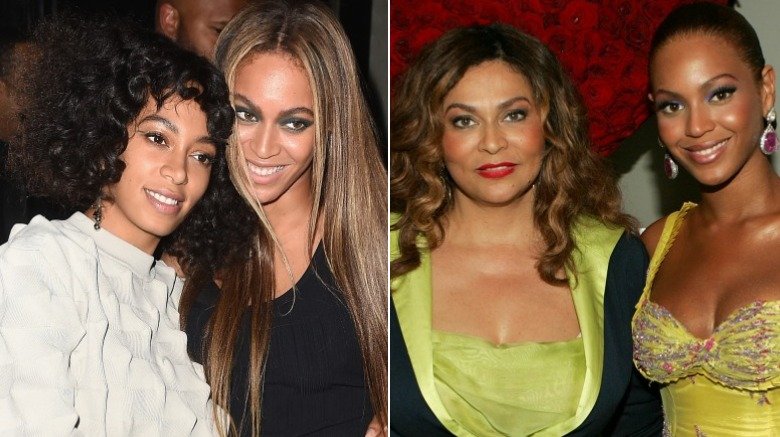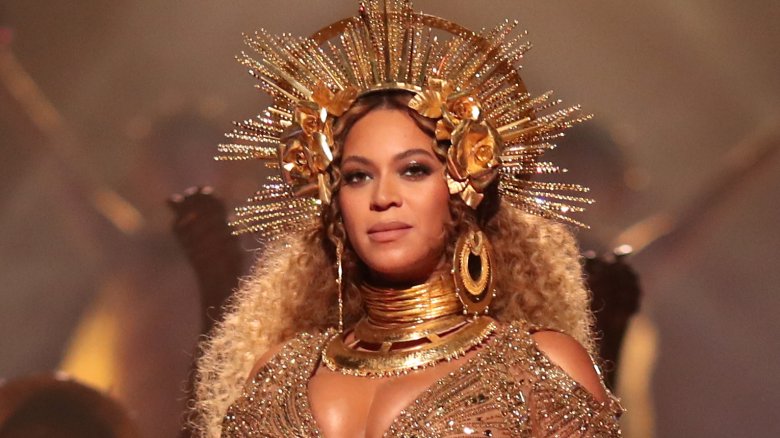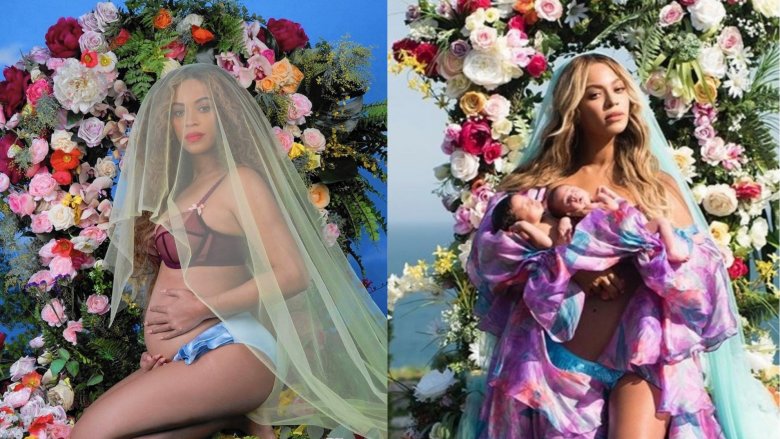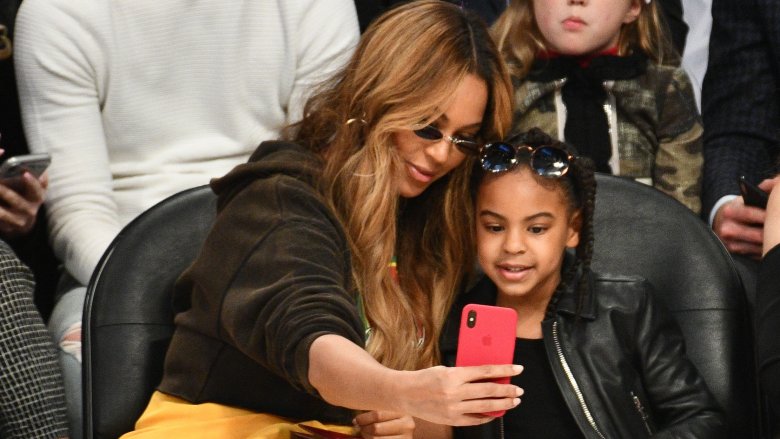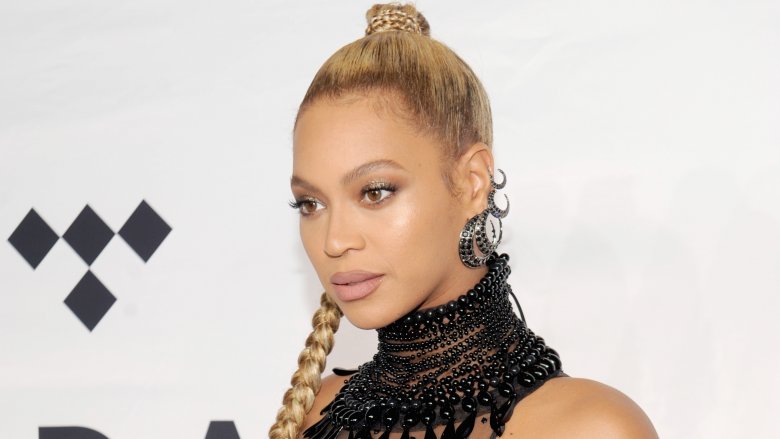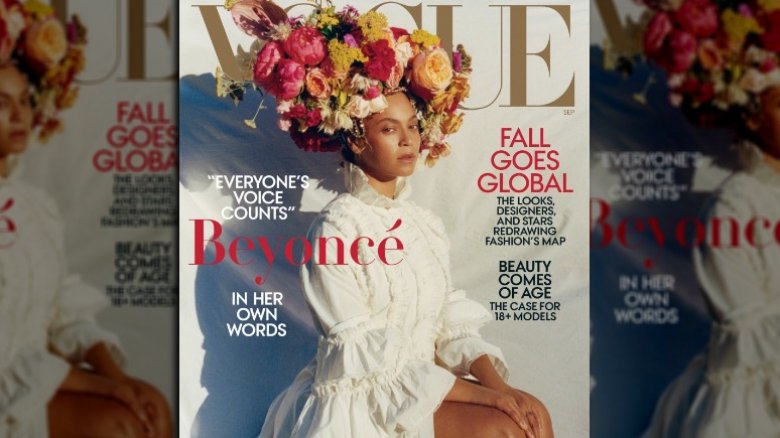Why Beyonce Stopped Giving Interviews
Beyoncé dominates the press with any and every move she makes, yet she rarely speaks to the press. Considering she is celebrated as one of the greatest performers on the planet and is lauded by critics and audiences alike for almost everything she releases, her decision to shy away from the media may seem baffling.
In her 2014 documentary, Beyoncé: Life is but a Dream (via Flavorwire), the singer explains the frustration she felt over rumors about her personal life and compared today's celebrity climate to the environment of years past. "When Nina Simone put out music, you loved her voice. That's what she wanted you to love," she says. "You didn't get brainwashed by her day-to-day life. That's not your business. It shouldn't influence the way you listen to the voice and the art, but it does."
In that documentary, Beyoncé says, "I always battle with how much I reveal about myself. How do I keep my humility and spirit? How do I continue to be generous to my fans and my craft? How do I stay current, but how do I stay soulful?"
Perhaps her answer to those questions may be to just disappear ... only to emerge on her own terms, as she did on the pages of Vogue in September 2018 (more to follow on that.) Join us as we explore all the potential reasons why Beyoncé stopped giving interviews.
She micromanages her image
One reason Beyoncé doesn't do interviews anymore is because she maintains intense control over her image. Don't believe it? See her 2013 cover story in GQ, in which the author describes the singer's office as having a "long, narrow room that contains the official Beyoncé archive, a temperature-controlled digital-storage facility that contains virtually every existing photograph of her, starting with the very first frames taken of Destiny's Child ... every interview she's ever done; every video of every show she's ever performed; every diary entry she's ever recorded while looking into the unblinking eye of her laptop."
Queen Bey's controlling reign over her own image doesn't end in her massive database, either. Soon after that GQ piece was published, Beyoncé's team reportedly entreated BuzzFeed to pull "unflattering" photos from her showstopping 2013 Super Bowl halftime performance. But let's be real: Even Beyoncé's worst photos are still better than 99.99 percent of everyone else's best photos, and the original BuzzFeed piece in question was arguably just pointing out how fierce she was and how hard she was dancing.
Her social commentary has been harshly criticized
Damned if you do, damned if you don't: Beyoncé kept the interviews she conducted pretty light for a long time, focusing on her music, acting, and occasionally her personal life. She rarely delved too deep into socio-economic issues, perhaps because when she did, she was attacked — and when she didn't, she was also attacked.
Salon published a piece in August 2015, blasting Bey for not speaking out on the Black Lives Matter movement, and yet it acknowledged her presence at a rally in memory of Trayvon Martin and noted that she and husband Jay-Z were rumored to have donated thousands of dollars to bail out protesters arrested in Ferguson, Mo., following the shooting of Mike Brown.
However, when Beyoncé did speak out on Black Lives Matter in her own way — bringing the mothers of Trayvon Martin, Mike Brown, Eric Garner, and Oscar Grant with her on the 2016 MTV Video Awards red carpet; paying tribute to the Black Lives Matter and Black Panther movements in the 2016 Super Bowl Halftime Show, blogging about the deaths of Philando Castile and Alton Sterling, and holding moments of silence for slain African Americans during her concerts — Rudy Giuliani blasted her and she was the subject of angry think-pieces from the Blue Lives Matter movement accusing her of being racist and of "inciting bad behavior." (She would later voice support for Dallas police officers who were killed in the line of fire, but that matters not to those who'd slam her regardless.)
She deemed her past interviews 'ineffective'
Many celebrities shun the press because even a throwaway statement made by someone as seemingly perfect as Beyoncé can be taken out of context to make her look, well, less than perfect. For example, in a 2013 GQ cover story, she threw in a quote that, when lacking context, made the world cringe: "I now know that, yes, I am powerful," she said. "I'm more powerful than my mind can even digest and understand."
Writer Margo Jefferson, who wasn't even granted an interview with Beyoncé for her September 2015 Vogue cover story, told The New York Times, "She has to be studying how effective her interviews have been so far. She may have decided that they do not contribute as dazzlingly to the portrait of Beyoncé as the other stuff. It's a perfectly reasonable decision."
Then, of course, there was this iconic moment on The View in which Whoopi Goldberg told Beyoncé that she's Beyoncé ... and Beyoncé said, "Thank you." (To be fair, it is a pretty massive compliment.)
Tiffany Haddish won't shut up about her
Why should Beyoncé bother giving interviews when Tiffany Haddish is happy to tell the world her business? In a profile of Haddish for GQ in March 2018, the comedian revealed that someone bit Beyoncé at a party, and Haddish said in a TV One interview (via Page Six) that the same unnamed woman also flirted with Jay-Z. Though Haddish didn't name names in the incident, it was later reported that the culprit was allegedly actress Sanaa Lathan, despite Lathan's denials. (Haddish played coy about Lathan in a subsequent interview with The Hollywood Reporter.)
Despite Haddish's loose lips, Beyoncé never officially addressed the controversy. However, that doesn't mean she didn't address it at all: Haddish blew up Queen Bey's spot so much that Beyoncé joked in the song "Top Off" that Haddish had to sign a non-disclosure agreement any time they partied together. Haddish later revealed that was no joke.
She wants her mom and sister to share some of the spotlight
Beyoncé has been in the spotlight since before she could drive, and sometimes it seems like she's tired of it. Lately, the superstar seems more keen on sharing the spotlight with her mother, Tina Knowles-Lawson, and her little sister, Solange Knowles.
For example, one of the only interviews Beyoncé has done recently is a January 2017 Interview magazine piece in which she interviews her sister, revealing little to nothing about herself save for a few sweet childhood memories with the "Cranes in the Sky" singer — the girl who'd eventually grow up to physically attack Jay-Z in an elevator.
In the same month, The New York Times published a profile on Knowles-Lawson. For that piece, Beyoncé conducted a brief Q&A over email through her publicist, reflecting on her mother's art collection and how Knowles-Lawson made her daughters feel beautiful and accepted as an African American woman.
One could argue that neither of these features would have made it to print or digital if it wasn't for Beyoncé's massive cultural influence.
She speaks through her music
Beyoncé has been through a lot in recent years, but she hasn't spoken about it. Instead, she's been singing about it.
For example, she's never spoken out about the elevator incident after the 2014 Met Gala, but she does allude to it in her "Flawless" remix, spitting, "We escalate up in this b***h like elevators / Of course sometimes s**t goes down when it's a billion dollars on an elevator."
With Lemonade, considered by many to be Queen Bey's magnum opus, Beyoncé describes the alleged turmoil in her marriage to Jay-Z, including his infidelities (which he'd later admit to in his own work.) Instead of giving an interview publicly calling out "Becky with the good hair," Beyoncé sings about her in "Sorry," leaving the public to desperately try to figure out who the other woman was. (To this day, no one is quite sure if Becky is an actual person or a representation of a type of person.)
In Jay-Z and Beyoncé's joint album, Everything is Love, the couple addresses everything from Jay's cheating to rumors that he fathered a love child — assuring the world through their music that now, between the two of them and their three beautiful children, everything is, in fact, love.
She's the queen of the 'Gram
Who needs media interviews when you have social media you can curate and control yourself? Certainly not Beyoncé. She broke the record for most Instagram likes on a single photo when she announced her pregnancy with twins on the photo sharing app in February 2017, racking up more than 11 million likes. She nearly doubled the previous record holder, Selena Gomez, who boasted 6 million likes on a sponsored Instagram post sipping Coca Cola from a straw.
Beyoncé didn't grant a single interview about her pregnancy with twins Rumi and Sir, but she did post a photo with them on Instagram one month after their birth in the same stylized aesthetic as her pregnancy announcement, racking up another 10 million-plus likes on the post.
"People are getting more savvy," public relations executive Jesse Parker Stowell told The New York Times. "They have their own form of media. They can just put it out on Instagram."
Motherhood changed her priorities
Beyoncé's absence from a lot of mainstream media became noticeable after the birth of her daughter, Blue Ivy — in part because people cruelly believed and proliferated the idea that she was never really pregnant.
Tina Knowles-Lawson told Vogue that the faux bump stories were "the most ridiculous thing in the world ... It's tough as a mother because people say all this crazy stuff ... and I want to say, 'You should tell them' sometimes. She'll say, 'Mom, I don't owe them that. Let them say what they want to say.'"
Beyoncé is clearly prioritizing motherhood and providing normalcy for her children over the glare of paparazzi cameras and Google Alerts. "I feel like I have something that has grounded me so much more" she told Vogue, after Blue's birth. "Family has always been important. I've always had my mother and my father and my husband. But it's just ... Life is so much more than [fame and money]. It's not defined by any of this." She added, "At some point it's very important to me that my daughter is able to experience life and run through the sprinklers and have slumber parties and trust and live and do all the things that any child should be able to do."
She likes being inaccessible
Beyoncé is on another level from other stars in the game right now. Widely regarded as the best performer of her generation, it seems like other celebrities, including Taylor Swift, are now attempting to adopt Bey's press-averse status with middling results.
As Yale professor Daphne A. Brooks told The New York Times, "[Beyoncé's] been able to reach this level of stardom in which she's managed — in a way that I really think is unique even among other black women entertainers — hyper-visibility and inaccessibility simultaneously." Brooks added that Bey's absence from the limelight encourages audiences to "to think about the art first [as opposed to] getting closer to the entertainer."
Also, the woman simply doesn't owe anyone anything anymore. Beyoncé told Vogue in 2013, "I don't feel like I have to please anyone. I feel free. I feel like I'm an adult. I'm grown. I can do what I want. I can say what I want. I can retire if I want. That's why I've worked hard."
She's wants to call all the shots
Beyoncé loves to control her narrative and everything around it. Her September 2018 Vogue cover story was one of her first in years, and Queen Bey reportedly exercised an unprecedented amount of control: providing the editorial content, choosing her photographer, and insisting on minimal hair and makeup styling. She wanted an accurate representation of herself as not just a grown woman, but a grown black woman.
As she explained in Vogue, "Until there is a mosaic of perspectives coming from different ethnicities behind the lens, we will continue to have a narrow approach and view of what the world actually looks like. That is why I wanted to work with this brilliant 23-year-old photographer Tyler Mitchell." She added, "...When I first started, 21 years ago, I was told that it was hard for me to get onto covers of magazines because black people did not sell. Clearly that has been proven a myth. Not only is an African American on the cover of the most important month for Vogue, this is the first ever Vogue cover shot by an African American photographer."
Bey also acknowledged how far she's come. "I look at the woman I was in my 20s and I see a young lady growing into confidence but intent on pleasing everyone around her," she said. "I now feel so much more beautiful, so much sexier, so much more interesting. And so much more powerful."

